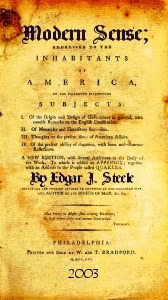“Society in every state is a blessing, but government even in its best state is but a necessary evil; in its worst state an intolerable one; for when we suffer, or are exposed to the same miseries by a government, which we might expect in a country without government, our calamity is heightened by reflecting that we furnish the means by which we suffer.” – Thomas Paine, Common Sense (Feb 1776)

There are a remarkable number of parallels between pre-revolutionary America and the America of today. It is downright spooky how, in their writings of that time, our founding fathers might have been speaking directly to this generation of Americans. Then again, I do not believe in coincidence so perhaps, in a sense, they were.
How appropriate that those of us who advocate a return to the ideals of those days are called “patriots,” a word which has taken on as derisive a meaning when mouthed by government agents today as those uttered about our forebears by King George’s men during the first American revolution.
Nor is it coincidence that those of us labeled as “patriots” wear the mark with respect and honor. I count myself proudly among their number and pray only that my work be worthy of inclusion.
It takes a little work to update the founding fathers’ works to modern forms of language and phrasing, but the result is nothing short of amazing, particularly when we replace “England” with “Federal Government” and “King George” with “The President.”
I have presumed to do just that with Thomas Paine’s “Common Sense” in this series, a four-part work written and published in early 1776 as part of a broad effort to convince the American settlers to declare independence from England. Continue reading →